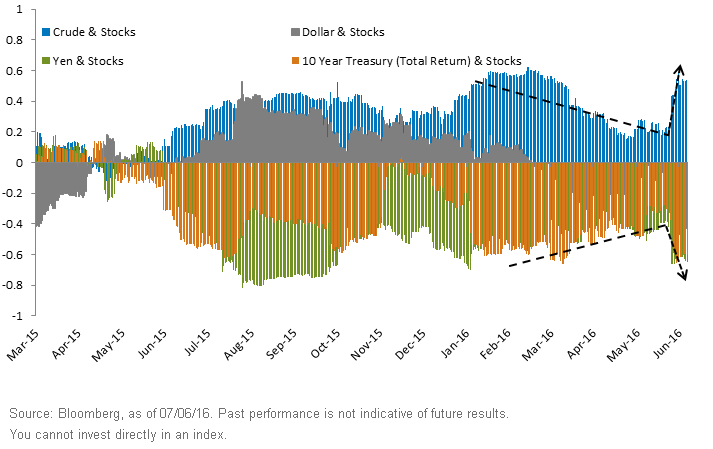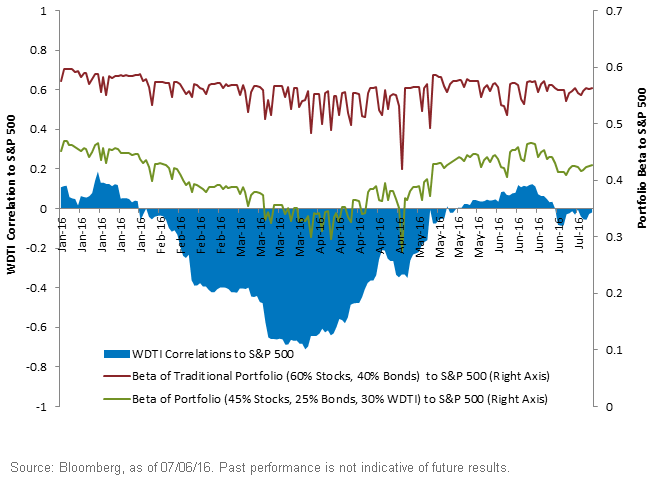Tackle Volatility with Managed Futures


 Stocks represented by S&P 500 Index, crude by Generic 1st Brent Crude Oil Contracts, dollar by Federal Reserve U.S. Trade-Weighted Major Currency Dollar Index, yen by Japanese yen measured against USD exchange rates, 10-Year Treasury represented by Ryan Labs Returns Treasury Yield Curve 10-Year Index .
Managed Futures Can Offer Diversification and Lower Portfolio Beta Compared with S&P 500
We know from Finance 101 that diversification is key for smart investments. However, the million-dollar question is, how do we find market-neutral behavior even in times of panic? One answer could be a strategy with risk/return drivers that are different from traditional equities and could therefore be uncorrelated to markets.
The WisdomTree Managed Futures Strategy Fund (WDTI) seeks to achieve positive total returns that are not directly correlated to broad market equity or fixed income returns in rising or falling markets. This is achieved through an investment mechanism that can go long or short in a basket of commodities, interest rates and currencies. The risk/return drivers of the WisdomTree Managed Futures Strategy Fund are very different from that of traditional stock/bond portfolios.
The chart below shows WDTI consistently had almost no correlations (blue area, left axis), even in the panic associated with Brexit, when we saw everything else getting more correlated. This could be a valuable solution to the diversification problem.
WTDI's Diversification Lowering Beta Of a Traditional 60/40 Approach
Stocks are represented by the S&P 500 Index holdings, and bonds are represented by the Barclays US Aggregate Bond Index.
Stocks represented by S&P 500 Index, crude by Generic 1st Brent Crude Oil Contracts, dollar by Federal Reserve U.S. Trade-Weighted Major Currency Dollar Index, yen by Japanese yen measured against USD exchange rates, 10-Year Treasury represented by Ryan Labs Returns Treasury Yield Curve 10-Year Index .
Managed Futures Can Offer Diversification and Lower Portfolio Beta Compared with S&P 500
We know from Finance 101 that diversification is key for smart investments. However, the million-dollar question is, how do we find market-neutral behavior even in times of panic? One answer could be a strategy with risk/return drivers that are different from traditional equities and could therefore be uncorrelated to markets.
The WisdomTree Managed Futures Strategy Fund (WDTI) seeks to achieve positive total returns that are not directly correlated to broad market equity or fixed income returns in rising or falling markets. This is achieved through an investment mechanism that can go long or short in a basket of commodities, interest rates and currencies. The risk/return drivers of the WisdomTree Managed Futures Strategy Fund are very different from that of traditional stock/bond portfolios.
The chart below shows WDTI consistently had almost no correlations (blue area, left axis), even in the panic associated with Brexit, when we saw everything else getting more correlated. This could be a valuable solution to the diversification problem.
WTDI's Diversification Lowering Beta Of a Traditional 60/40 Approach
Stocks are represented by the S&P 500 Index holdings, and bonds are represented by the Barclays US Aggregate Bond Index.
 One benefit of higher diversification is lower volatility. Measured using the beta of the S&P 500 to gauge the sensitivity to traditional equities, the chart above shows how a traditional 60%/40% equity/bond portfolio investor can also significantly lower portfolio beta to markets by allocating to a strategy like WDTI.
WisdomTree believes investors could use managed futures for the potential to provide diversification and a lower portfolio beta. The WisdomTree Managed Futures Strategy Index uses a quantitative, rules-based approach that can diversify your equity beta. We think WDTI could be an answer for investors looking for an asset class that offers the potential for total returns with lower volatility and higher diversification, especially during times of stress in the market. Learn more about the WisdomTree Managed Futures Index.
1Source: Bloomberg.
One benefit of higher diversification is lower volatility. Measured using the beta of the S&P 500 to gauge the sensitivity to traditional equities, the chart above shows how a traditional 60%/40% equity/bond portfolio investor can also significantly lower portfolio beta to markets by allocating to a strategy like WDTI.
WisdomTree believes investors could use managed futures for the potential to provide diversification and a lower portfolio beta. The WisdomTree Managed Futures Strategy Index uses a quantitative, rules-based approach that can diversify your equity beta. We think WDTI could be an answer for investors looking for an asset class that offers the potential for total returns with lower volatility and higher diversification, especially during times of stress in the market. Learn more about the WisdomTree Managed Futures Index.
1Source: Bloomberg.
Important Risks Related to this Article
There are risks associated with investing, including possible loss of principal. An investment in this Fund is speculative and involves a substantial degree of risk. One of the risks associated with the Fund is the complexity of the different factors that contribute to the Fund’s performance, as well as its correlation (or noncorrelation) to other asset classes. These factors include use of long and short positions in commodity futures contracts, currency forward contracts, swaps and other derivatives. Derivatives can be volatile and may be less liquid than other securities and more sensitive to the effects of varied economic conditions.
The Fund generally does not make intramonth adjustments and therefore is subject to substantial losses if the market moves against the Fund’s established positions on an intramonth basis. The Fund is actively managed, thus the ability of the Fund to achieve its objectives will depend on the effectiveness of the portfolio manager. Due to the investment strategy of this Fund, it may make higher capital gain distributions than other ETFs. Please read the Fund’s prospectus for specific details regarding the Fund’s risk profile.
Commodities are generally volatile and are not suitable for all investors.
Diversification does not eliminate the risk of experiencing investment loss.


